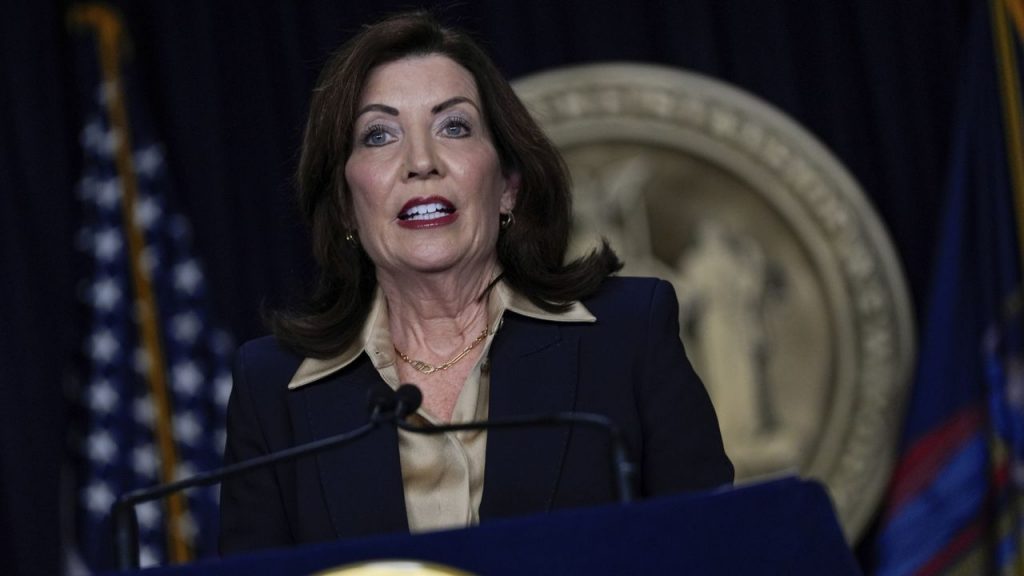Gov. Kathy Hochul recently told the State Legislature that she is open to implementing some restrictions on public mask-wearing in the upcoming state budget.
Hochul’s communications director last week said the governor supports a bill in the legislature that would create a new criminal offense called “masked harassment,” according to a New York Times report. She is aiming for any restrictions to be included as part of the over-$250 billion state budget.
State law for more than 150 years allowed police to charge people who were “masked or in any manner disguised by unusual or unnatural attire or facial alteration” and gathered in public with other masked individuals. It was suspended during the COVID-19 pandemic and repealed in 2020 amid national outcry and protest over George Floyd’s murder. Activist groups at the time released a memo saying the mask ban and other state laws “allow for discriminatory and abusive police practices and put public health at risk.”
Hochul’s renewed interest in public masking restrictions began last June amid a rise in antisemitic and Islamophobic hate crimes and an upswing in New York City protests, with many who opposed Israel’s military campaign in Gaza choosing to wear masks to protect against doxxing. During an Albany press conference last week, Hochul said she supported some restrictions on masking.
“Masks used in the commission of a crime are deeply troubling to me,” Hochul said. “Think about a bank robber, walks in, their face is covered. Someone assaults someone on the subway, they can get away with it despite the fact that we have cameras because they are masked.”
“And so this is something that, as I’m protecting public safety, is very much top of mind,” she continued.
The Trump administration has begun cracking down on pro-Palestinian protests on college campuses. Mahmoud Khalil, a recent Columbia University graduate and green card holder who led negotiations during the pro-Palestinian encampments, was detained by U.S. Immigration and Customs Enforcement in early March, with President Donald Trump supporting efforts to deport him.
Robert Shibley, a special counsel for campus advocacy at a nonprofit organization, the Foundation for Individual Rights and Expression, told The Hill that he was concerned about how Khalil’s arrest could affect free speech in colleges and universities.
“When you have a class of people, noncitizens, who suddenly have to worry more about whether or not something they may say in that debate could result in their deportation … that is going to affect what people are willing to talk about on campus,” Shibley said. “Not just for the international students, but also for professors and for their fellow students who are Americans.”
Some Democrats expressed similar concerns with legal restrictions on mask-wearing. Assemblymember Emily Gallagher, a Democrat from Brooklyn, said a mask ban could pose a public health risk and be unfairly enforced, pointing to Khalil’s arrest, according to reporting from The Gothamist.
The Graduate Student Employees Union told Pipe Dream they were “deeply concerned” about the proposal, citing its potential impacts on people with chronic illnesses and immune-compromising conditions.
“The ban undermines the fundamental rights of protesters by giving law enforcement greater ability to target and identify individuals exercising their freedom of speech and assembly,” they wrote.
Saul Hakim, a member of the Student Association Congress and a senior double-majoring in political science and Judaic studies, authored a resolution introduced at an Oct. 8 Congress meeting supporting two state bills that would “prohibit the use of hoods, masks, and other facial coverings to conceal identity during lawful and unlawful assemblies or riots.”
It requested that University administrators and the SUNY Board of Trustees amend the Student Code of Conduct to include these provisions. Wearing “personal protective equipment during public health emergencies” or for religious purposes would be exempted. The bill was ultimately vetoed by the SA’s E-Board.
“I still believe that there are individuals across the state who exploit masking to avoid accountability, particularly during protests or disruptive activity,” he wrote. “While I acknowledge the importance of masks for medical, religious, and other protected reasons, I continue to support the idea of a narrowly tailored policy, with appropriate exceptions, that addresses bad-faith use without infringing on rights.”
Opponents of the legislation raised concerns that it would endanger student health and interfere with activists’ free speech rights.
“I think that students and people in general should be able to prioritize their own safety while also standing up for something they believe in, and we have seen historically across the country, particularly in regards to this issue, when it comes to the the ongoing conflict in the Middle East, where students are being doxxed,” Lotus Taylor, a Hillside Community representative, the SUNY Student Assembly’s secretary and a junior majoring in sociology, said at the meeting.



